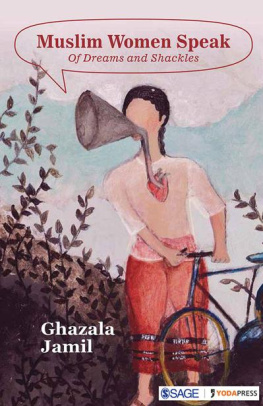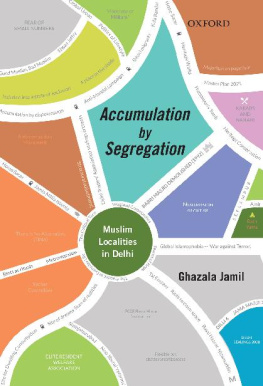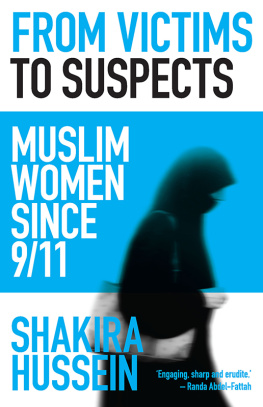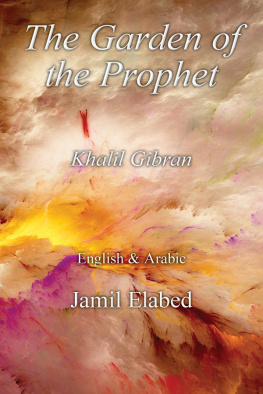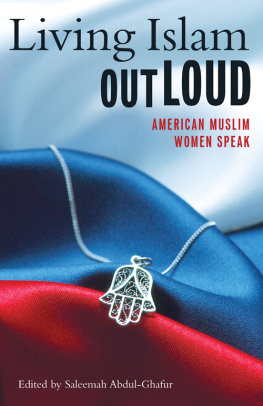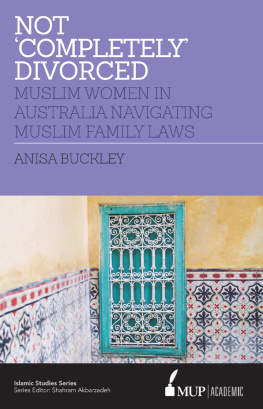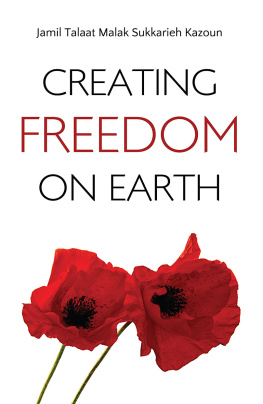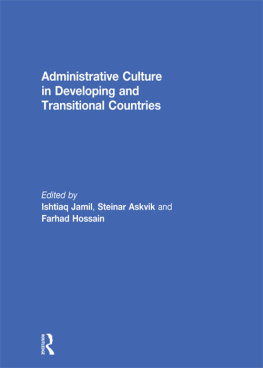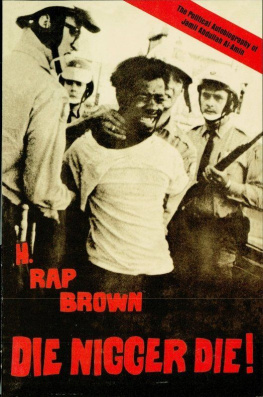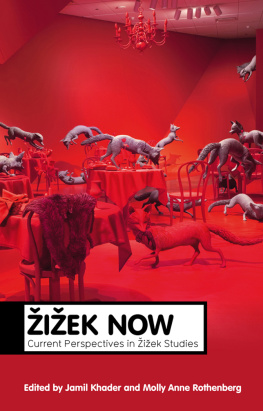Ghazala Jamil - Muslim Women Speak: Of Dreams and Shackles
Here you can read online Ghazala Jamil - Muslim Women Speak: Of Dreams and Shackles full text of the book (entire story) in english for free. Download pdf and epub, get meaning, cover and reviews about this ebook. year: 2017, publisher: SAGE Publications / Yoda Press, genre: Politics. Description of the work, (preface) as well as reviews are available. Best literature library LitArk.com created for fans of good reading and offers a wide selection of genres:
Romance novel
Science fiction
Adventure
Detective
Science
History
Home and family
Prose
Art
Politics
Computer
Non-fiction
Religion
Business
Children
Humor
Choose a favorite category and find really read worthwhile books. Enjoy immersion in the world of imagination, feel the emotions of the characters or learn something new for yourself, make an fascinating discovery.
- Book:Muslim Women Speak: Of Dreams and Shackles
- Author:
- Publisher:SAGE Publications / Yoda Press
- Genre:
- Year:2017
- Rating:5 / 5
- Favourites:Add to favourites
- Your mark:
- 100
- 1
- 2
- 3
- 4
- 5
Muslim Women Speak: Of Dreams and Shackles: summary, description and annotation
We offer to read an annotation, description, summary or preface (depends on what the author of the book "Muslim Women Speak: Of Dreams and Shackles" wrote himself). If you haven't found the necessary information about the book — write in the comments, we will try to find it.
Muslim Women Speak: Of Dreams and Shackles — read online for free the complete book (whole text) full work
Below is the text of the book, divided by pages. System saving the place of the last page read, allows you to conveniently read the book "Muslim Women Speak: Of Dreams and Shackles" online for free, without having to search again every time where you left off. Put a bookmark, and you can go to the page where you finished reading at any time.
Font size:
Interval:
Bookmark:



Thank you for choosing a SAGE product!
If you have any comment, observation or feedback,
I would like to personally hear from you.
Please write to m e at
Vivek Mehra, Managing Director and CEO, SAGE India.
Bulk Sales
SAGE India offers special discounts
for purchase of books in bulk.
We also make available special imprints
and excerpts from our books on demand.
For orders a nd enquiries, write to us at
Marketing Department
SAGE Publications India Pvt Ltd
B1/I-1, Mohan Cooperative Industrial Area
Mathura Road, Post Bag 7
New Delhi 110044, India
E-mail us at
Get to know more about SAGE
Be invited to SAGE events, get on our mailing list.
Write today to
This book is also available as an e-book.

Ghazala Jamil

Copyright Ghazala Jamil, 2018
All rights reserved. No part of this book may be reproduced or utilized in any form or by any means, electronic or mechanical, including photocopying, recording, or by any information storage or retrieval system, without permission in writing from the publisher.
First published in 2018 by

SAGE Publications India Pvt Ltd B1/I-1 Mohan Cooperative Industrial Area Mathura Road, New Delhi 110 044, India www.sagepub.in | YODA Press 79 Gulmohar Enclave New Delhi 110049 www.yodapress.co.in |
SAGE Publications Inc
2455 Teller Road
Thousand Oaks, California 91320, USA
SAGE Publications Ltd
1 Olivers Yard, 55 City Road
London EC1Y 1SP, United Kingdom
SAGE Publications Asia-Pacific Pte Ltd
3 Church Street
#10-04 Samsung Hub
Singapore 049483
Published by Vivek Mehra for SAGE Publications India Pvt Ltd, typeset in 10/12 pts Berkeley by Zaza Eunice, Hosur, Tamil Nadu, India and printed at Chaman Enterprises, New Delhi.
Library of Congress Cataloging-in-Publication Data Available
ISBN: 978-93-528-0502-0 (ePub)
SAGE Yoda Team: Sonjuhi Negi, Alekha Chandra Jena and Ishita Gupta
Contents
Chashm-e-nam, jaan-e-shoreeda kafi nahin
Tohmat-e-ishq-e-posheeda kafi nahin
aaj bazaar main pa-bajolan chalo
Faiz Ahmed Faiz
Teary eyes and stormy life are not enough
Even the accusation of a hidden passion is not enough
Come, walk today in public, wearing your shackles
Translated by Ghazala Jamil
Let me begin by expressing my gratitude to the Bhartiya Muslim Mahila Aandolan (BMMA) for giving me the opportunity to create this work with the help of all its activists. Special thanks are due to Zakia Soman, one of the founders of BMMA, who trusted my ideas right from the word go and provided me with all possible support and space. Each member on the research team at the field level completely owned this study right after I conceived it in its present shape. Without their collective experience and skills it would not have been possible to realise the theoretical ideas.
This work continued to be a passion for me long after I had submitted the project report to BMMA. I kept chiselling the manuscript though the years, and growing and learning with it. Needless to say all its shortcomings are my own although I do hope that all the participants of the study will own the work in its present form too.
My acquaintance with many of the ideas and approaches presented in this report began as a student of Professor Manoj K. Jha at Jamia Millia Islamia. His faith in my ability to rise up to the demands of any occasion and do the necessary work has seen me successfully finish many assignments including this one. He offered painstaking comments on my ideas and writings, always giving critical suggestions that improved my work while still respecting my voice.
Thank you Arpita Das, my editor at Yoda Press for seeing the potential in the manuscript. Her faith in this work gave me the confidence to put it out in the public domain at a time when the reactions of many others made me anxious.
Thanks are due to my partner and friend Nasir for his love, humour, and indulgence; our daughters Miftah and Mael for accepting and challenging their Ulti-Sulti Amma . No amount of gratitude can ever capture the love and limitless generosity of my familyZafar, Salma, Faiz, Paromita, Sidra and Andleeb I can only ever thank inadequately.
The memory of my parents Azmat Ullah and Anwari Begum narrating their own experiences to me, is my most empowering resource. I dedicate this work to you Amma and Abbafor never discouraging me (their most talkative child) from spinning a yarn and for enabling the daughter to find her voice.
Thanks are due to Baaraan Ijlaal and Sadbhavana Trust for their kind permission to use the artwork on the cover, and to Dipta Bhog and Purwa Bharadwaj for their introduction to the artist and facilitating the permissions.
Research Team Members
A. Siddique, Abhishweta Jha, Aparna, Azra, Balkeis Begum, Farhat Amin, Father Anil, Ghazala, Ghazala Jamil, Hashmi Bano, Isabella, Jamsheena KP, Jasla K, Jeibunisha R, Kamila, Majida CV, Mali Sawariya, Mubeena NP, Muskaan Shaikh, Naaz Raza, Naghma Nadaf, Naish Hasan, Namita Jainer, Nazia Perveen, Nazneen Falaq, Nishat Hussain, Noorjahan Diwan, Noorjahan Safia Niaz, Nusrat Yakub Pathan, Pallavi Patnaik, Parveen Kokianwala, Preety Rani, Rafat Jahan, Rajiya Begum, Riyaz Babu, Rozalin Sahoo, Rubeena Bano, Sabiha Rehman, Salima Akhtar, Samira Shah, Sarwar Raza, Shafeena TNK, Shah Alam, Shahda Bari, Shameem Khan, Shehzadi Parveen, Subair CK, Subhashree Sanyal, Suraiya Shaikh, Tasleem Banoo, Zakia Soman, Zuleikha Jabin.
Title of Kamla Bhasins book. (Trans.) Topsy-turvy mom.
I
Allah taala ne aurat ko bhi insaan banaaya hai
(Allah has created woman too, in the human form)
On the first reading, these words, spoken by a young Muslim woman from Mumbai, are simply a statement of a person of faith about her own creation. On a closer second reading, the statement seems to be accessing and commenting upon various realities. It is a comment on the inequality that women are subjected to, how they are made to feel subhuman, a commodity to be consumed. The statement is an assertion that a woman too is a human being, a human being just like a man. On another and deeper reading the statement seems to include a firm belief of the speaker that there is inherent justice in this narrative of creation of a woman in human form and a complaint that this justice has been subverted. This reading includes a cognisance of her conviction that her emancipation as an equal human being is thus possible within the arena of her own faith.
How do we begin looking at the possibility of a just and humane world that treats Muslim women as equal human beings? In this work I have attempted to engage in a critical exercise of recounting a complex web of problems which get into the very way of imagining such a world. Although critical, it is not meant to be an exercise in cynicism. It is conceived in a way, however inadequate, to regard the experiences of Muslim women in India and the philosophical problems of our times embedded in these experiences. In terms of research, the attempt is to respond to the problem posed by Horkheimer (1931, p. 14), as symbolic of the peculiar difficulty of social philosophythe difficulty concerning the interpenetration of general and particular, of theoretical design and individual experience. Towards this attempt I navigated the boundaries of disciplines such as Sociology, Politics, Psychology, etc., and used hybrid methodological and epistemological resources. This allowed me to recast the problems of Indian Muslim Woman and Indian Muslims in newer concepts and frames of inquiry.
Font size:
Interval:
Bookmark:
Similar books «Muslim Women Speak: Of Dreams and Shackles»
Look at similar books to Muslim Women Speak: Of Dreams and Shackles. We have selected literature similar in name and meaning in the hope of providing readers with more options to find new, interesting, not yet read works.
Discussion, reviews of the book Muslim Women Speak: Of Dreams and Shackles and just readers' own opinions. Leave your comments, write what you think about the work, its meaning or the main characters. Specify what exactly you liked and what you didn't like, and why you think so.

